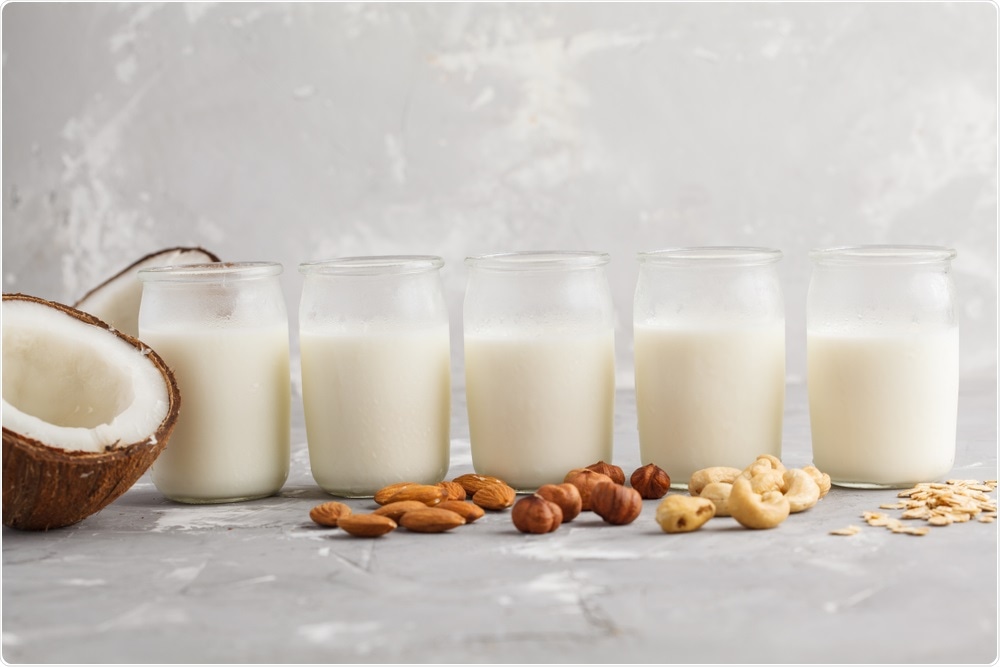In the last decade, plant-based milk has dramatically increased in popularity, which researchers believe is being driven by the politics of milk consumption, where the consumer is encouraged to have a conscience about the environment, their health, and animal welfare.

Image Credit: Nina Firsova/Shutterstock.com
The rise in plant-based milk is symbolic of the growing trend to transition from meat and animal-based products to plant-based foods to support sustainable and ethical food production, as well as to avert the detrimental health impacts of dairy.
The growing “mylk” market
The market for plant-based alternatives to milk, known as mylks, has shown rapid growth in recent years. With sales increasing by 61% between 2012 and 2017, reaching a total market value of $1.9 billion in 2019. In 2018, in the US, mylks generated around 13% of milk sales, and in the UK they accounted for roughly 8% of sales. Also, mylk companies have the backing of big banks who have invested tens of millions into alternative milk businesses over recent years.
The rise in mylk popularity isn’t a stand-alone phenomenon. Other plant-based dairy alternative food types, such as cheese, creamer, ice cream, and yogurt, all showed a boom in sales in the US, with revenues generated from sales of these products doubling between 2017 and 2019.
This growing trend was recently evaluated by British researchers. Last month, a team of scientists at the University of Oxford, in the UK, published a paper in the journal Agriculture and Human Values in which they examine the politics surrounding the emergence of plant-based products in the main-stream, and evaluate how mylks are marketed as a dairy alternative.
Mylks began as very much an alternative, niche product, that was initially marketed to consumers that chose to eat non-dairy products for health reasons (such as dairy intolerance), or lifestyle choices (such as veganism).
However, now experts have revealed that the boom in mylk popularity is being driven by a different market, the growing group of people who choose to reduce the volume of meat and animal-based products they consume for the good of animal welfare, the environment, and their health. There is an increasing consciousness when it comes to choosing the food we consume, now, more than ever, people are aware of the environmental impact of not only the food they eat but all consumer products.
People are also more aware of the treatment of animals, particularly in the industrial meat producing sector. Finally, consumers are now more health-conscious and have more access to information about how food is impacting their immediate and long-term health.
Because of these factors, consumers are increasingly choosing products that they believe to have less of a detrimental impact on the environment, nature, and themselves (i.e. their health).
The concerns of these consumers have been picked up on by the mylk market, who are promoting plant-based milk as a solution to the issues arising from the dairy-milk market, while still maintaining the positive, wholesome image that milk has established over decades.
The politics of plant milk
In recent years, information has become to flood into public awareness regarding the ecological and moral implications of meat and dairy production, distribution, and consumption. To many people’s surprise, the food they had been consuming was not as wholesome and “good for you” as they had been led to believe.
The stance that mylk companies have taken is that they are rebuilding trust between consumers and an alternative product marketed as retaining all the positive angles of milk and dairy while providing a solution to the social and ethical drawbacks of purchasing these products.
Experts have referred to the politics of the mylk market as ‘palatable disruption'. This concept extends on the framework of ‘non-disruptive disruption’ which is believed to be at the foundation of the ‘new green spirit of capitalism’. These non-disruptive disruptions provide solutions to a problem without changing the underlying causes of the problems.
The palatable disruption concept can look at how the most-milk generation promotes the “ethic of care”. The Oxford research team established that in this era responsibility has been handed to the consumer to promote environmentally sustainable and socially just agriculture and food production. In doing this, they feel a level of responsibility to choose products that are considered ethically fair and sustainable, such as mylks.
While encouraging consumers to choose mylk over dairy milk, the consumer is still encouraged to consume this basic product, with the apparent necessity of the milk product remaining evident.
In addition, mylks exploit the positive and wholesome image that dairy milk has established over the years, such as being healthy, wholesome, convenient and tasty. These alternative products retain these values while being free of the ‘bad’ connotations now established with dairy milk, such as being cruel to animals and damaging to the environment.
Source:
Journal references: